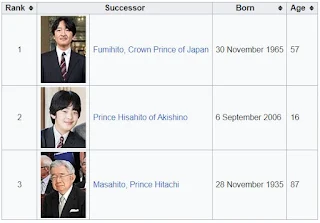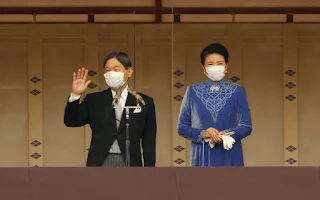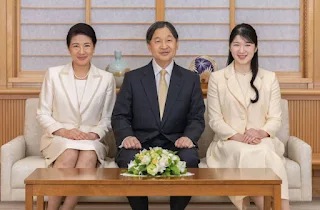Last month, Japan's Prime Minister Fumio Kishida made a surprise announcement of reopening the discussion of changing the archaic succession law of Japan, which has been stalled many times.
He said that the issue must be tackled the soonest and cannot be postponed as it concerned the future of the Japanese Imperial Family and the line of succession.
Currently, Emperor Naruhito of Japan has only three living male heirs as the Japanese Imperial Succession Law prohibits females from succeeding to the throne.
 |
| The current line of succession to the Chrysanthemum throne in Japan |
Princess Aiko, also known as Princess Toshi, is the only child of Emperor Naruhito and Empress Masako of Japan. She was born on December 1, 2001, eight years after her parents got married on June 9, 1993.
Her mother, then Crown Princess Masako, came under pressure in providing the throne with a male heir, after all, the Japanese Imperial Throne does not allow females to succeed.
When she gave birth to a daughter, concerns about discontinuing the line of succession on Naruhito's bloodline became widespread and Crown Princess Masako sank into depression.
She ultimately withdrew from public life and lived behind palace walls. She returned to imperial duty full-time only when her husband became emperor in 2019.
 |
| Emperor Naruhito and Empress Masako of Japan. Credit: Japan Imperial Agency |
The dwindling male members of the Japanese imperial family became a concern to the Japanese government. Currently, Emperor Naruhito has only three living heirs. His younger brother, Crown Prince Fumihito, 57, his nephew Prince Hisahito, 15, and his paternal uncle Prince Hitachi, 87.
In 2005, when Princess Aiko was three years old, the discussion of changing the Succession Law to male-preference primogeniture was discussed. However, a year later, in September 2006, Naruhito's sister-in-law, Princess Kiko, gave birth to a son, Prince Hisahito, which halted the discussion.
In 2021, it was reopened. The government formed a panel to tackle the issue. The panel agreed to ask experts about 10 key points including their positions on including female or matrilineal imperial members in the line of succession and adoption of male heirs from former branches of the imperial family.
 |
| Emperor Naruhito and Empress Masako of Japan. Credit: Japan Imperial Agency |
Currently, Japanese princesses who will marry commoners will force to leave the imperial family. They will also strip of their title and inheritance. In 1999, based on poll results, the Japanese public did not want a female successor.
But time has changed. In present-day Japan, the citizens are increasingly in favor of the possibility of an empress regnant or a female heir-apparent, just like in Europe.
In 2021, a Kyodo News Poll showed 85 percent of respondents supported the move. In January 2022, the government submitted to the Diet a report compiled by a panel of experts that proposed two measures.
One suggestion was to allow female members to remain part of the Imperial family even after marriage, and the other was to use adoption to restore Imperial status to members of former Imperial family lines.
But conservatives in the ruling Liberal Democratic Party are reluctant to make significant changes to rules on imperial succession. So the discussion was again stalled.
 |
| Emperor Naruhito with Empress Masako and their only child, Princess Aiko |
However, on February 26, 2023, three days after Emperor Naruhito celebrated his 63rd birthday, Japanese Prime Minister Fumio Kishida made a surprise announcement to reopen the discussion,
He said that the Diet would discuss a stable succession to the throne as this issue that can no longer be postponed.
Liberal Democratic Party members were surprised at the same time confused by the Prime Minister's unexpected announcement but they said they would address the issue.
Nippon Ishin (Japan Innovation Party) has been the most proactive of the parties. In April 2022, Ishin submitted to the Diet a written opinion evaluating a proposal to reinstate male members of the former Imperial families, while also calling for a revision of the Imperial House Law.
At a press conference on Feb. 28, Ishin party head Nobuyuki Baba, seemed to agree with Prime Minister Kishida, saying: “Other parties have put the issue on the back burner. It’s high time to start discussions".
 |
| From left: Prince Hisahito, Crown Prince Fumihito, Crown Princess Kiko, and Princess KaKo |
The unpopularity of Crown Prince Fumihito and the scandal brought by the marriage of his eldest daughter, former Princess Mako (due to the background of her now husband, Kei Komuro) have largely contributed to the swing of public opinion on allowing a female heir apparent. A survey in 2021 showed more than 80% would like Princess Aiko to be her father's direct successor.
Will this recent plan to reopen the discussion on changing the succession law of the Japanese imperial throne come to fruition? Can Princess Aiko finally be made the Crown Princess in her own right?
Let's wait and see. It seems this latest development is getting interesting and we are excited to follow the progress. We are hoping Japan's Diet can finally come up with a clear resolution to change the succession law.
Meanwhile, Crown Prince Fumihito, the heir-presumptive of Emperor Naruhito, will attend the Coronation of King Charles III in London this coming May, according to sources.
On February 23, 2023, Emperor Naruhito turned 63. He greeted preselected visitors from the palace's balcony in his first birthday appearance since he ascended to the throne. This birthday tradition in 2020, 2021, and 2022, were canceled due to the pandemic.
“I am truly grateful for having my birthday celebrated in this way by all of you,” he said. Regarding his upcoming 30th wedding anniversary (June 9, 2023) with his wife, Empress Masako, the emperor said:
“We have come this far by sharing our joys and sorrows. The empress is an important presence who supports me in daily life and someone with whom I can talk regarding both public and private matters.” he said.
The emperor, who was diagnosed with an enlarged prostate last year, but has experienced no further abnormalities, has expressed gratitude for the public’s concern, saying, “I am spending my days as usual.”







0 Comments